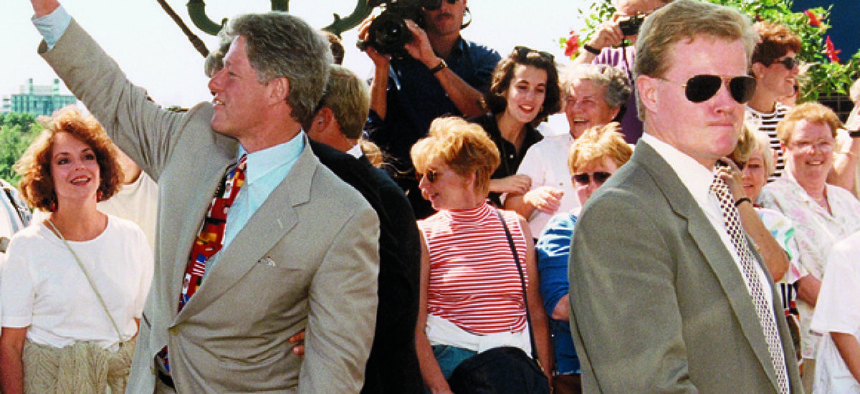
The author on Bill Clinton's detail in 1993. Courtesy Dan Emmett
Protective Details
Dan Emmett’s memoir offers an unvarnished look at life in the president’s security detail without the gossip.
By Andrew Lapin
If you’re looking for lots of salacious material about past presidents in Dan Emmett’s new memoir about his two decades as a Secret Service agent, look again. Within Arm’s Length (iUniverse) is just what one would reasonably expect from someone whose mission through three presidential administrations was to keep his high-profile charges out of harm’s way. “I wanted to write an unvarnished look at the life of an agent without telling out-of-school stories about protectees,” Emmett says. “Anyone who takes the three hours required to read it will realize that my motives in writing the book were pure.”
But there still are many intriguing details about the challenges of safeguarding the most powerful person on the planet. Among the highlights are stories about securing adequate coverage for Bill Clinton when he would decide to go for a run through Washington or try his luck wandering through the demilitarized zone dividing North and South Korea.
Emmett, an adjunct professor and security consultant who retired from the Secret Service in 2004, is not the first to write an account of life as the president’s protector. The Secret Service discourages employees from sharing behind-closed-doors details, as spokesman Ed Donovan told the Washington Examiner in March, saying doing so could “erode the trust we have with our protectees.”
Despite such reactions, Emmett is confident other agents enjoyed his book. He has the emails to prove it.
Hey, TSA, Can You Spare A Dime?
Republicans on the House Homeland Security Committee have been a thorn in the side of the Transportation Security Administration, which they’d like to see shrunk. Now they’re hoping to lean on the agency to support U.S. troops overseas.
In March, the panel’s Transportation Security Subcommittee approved a bill, H.R. 2179, to direct unclaimed money found by screeners at airport checkpoints to be donated to the USO. Currently, money left behind by passengers is applied toward TSA’s operating expenses.
“TSA makes every effort to reunite passengers with items left at the checkpoint,” says Kimberley Thompson, an agency spokeswoman. “However, these funds are primarily a result of unclaimed, loose coins passengers remove from their pockets and discard at the checkpoint.” Per airport, the unclaimed change totals about $1,085 per year, or less than $3 per day.
But in the aggregate the amounts are not inconsequential: $487,869.50 in fiscal 2011 at 450 airports, including $26,000.58 in foreign currency, TSA says in its annual report. So the change would amount to a budget cut.
- Charles S. Clark
The Kindest Of Cuts
Under friendly fire, Reagan-era executives played a leading role in shuttering their own agency.
Few in today’s Washington likely recall the Community Services Administration, an independent anti-poverty agency that died back in the Reagan administration. Besides membership in that relatively small club of agencies that budget slashers succeeded in abolishing, CSA also bears the distinction of having been done in under remarkably friendly circumstances.
Its story has been revisited in a newly published book Transforming American Governance: Rebooting the Public Square, edited for the National Academy of Public Administration by Alan P. Balutis and Dwight Ink, former federal executives, and Terry F. Buss, professor of public policy at Carnegie Mellon University.
Ink explains how President Reagan, having been elected in 1980 on a shrink-the-government platform, expected to encounter hostility when he targeted the CSA. But he pulled a surprise. Instead of appointing a right-wing “fox guarding the henhouse” leader to phase out the agency, Reagan named a career civil servant. He also retained experienced employees in regional offices to recommend final recipients for CSA grants and to prepare for the shutdown.
The in-house career team was swayed enough to recommend innovations to facilitate the termination. “Although none of the employees agreed with the closure that would end their employment and the programs they supported, they responded to the president’s policy decision with hard work rather than the activist undermining so widely predicted,” Ink writes. “Because of their knowledge of how government worked, and their dedicated effort, the agency was closed only seven weeks after Congress agreed.”
Charles S. Clark
NEXT STORY: Around Government






